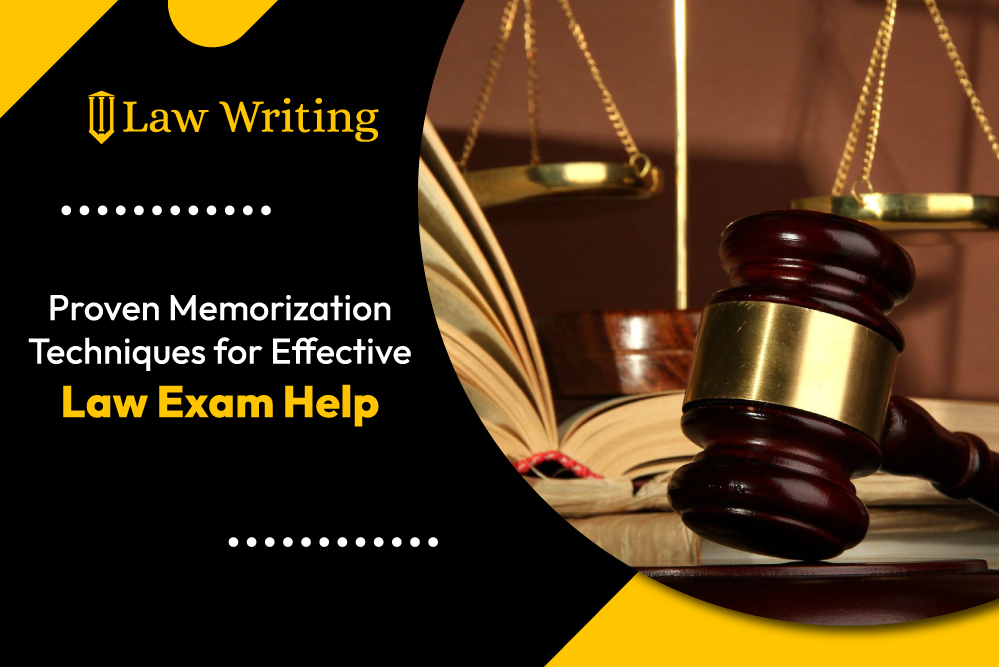The biggest fear for every law student as well as professional is to forget every law, legislation, case, constitution, and bill they have studied in their academic and professional career. Memory plays a crucial role in the legal world around us. So, whether taking notes, constructing outlines, studying, or attending class, you need to pay attention to every detail. Ever gotten stuck with a blank mind and considered taking a law exam help service to get rid of that situation? If so, then you would know that there are still law schools available that allow you to take your exams using the material you have learned.
Are you an aspiring lawyer who is looking for some of the best memorization techniques for exams that can help you with your finals? If so, then no worries, as we are here to provide some proven techniques that can not only help you memorize your course but also help you achieve good grades.
Every law student out there knows that they need to learn complex and detailed data for a successful career. So they try their best to look for the best memorization techniques for studying and retaining information. This helps them to be motivated enough to avoid bad grades and remember all sections, rules, and legislation.
So, how to remember study material quickly? Or what is the secret behind achieving the desired position in a legal career? There must be so much on your mind. Well, you don’t have to worry anymore, as we will discuss every secret in this guide. So, what are you waiting for? Let’s get started.
How Does Memory Work?
Before knowing how to remember everything you study for exams, we need to understand how memories work for real. That’s right. In order to appreciate this magical gift, you must know that behind every technique there are some sort of basics. Since the human brain is full of so many complexities, let’s break it down with an explanation by neuroscientist Daphna Shohamy.
In How Memory Works, published by Harvard University, she said that human memory is a record in the brain of something that happened in the past. She added that three ways characterize memory, which includes encoding, storage, and retrieval.
You must know that implementing effective study tips for exam success can significantly improve your performance. If you are really looking forward to what is the science behind memorization techniques, then you should know everything about these three terms. Firstly, the term encoding refers to how you understand and learn data when you connect sentiments and meaning to certain data. It is referred to as semantic encoding. So, you are more likely to remember it clearly and recall it later on.
Secondly, the phrase storage refers to how much data is saved in a brain. You know what? There are usually two types of memories highlighted in a brain, which are short-term memory (STM) and long-term memory (LTM).
Lastly, retrieval memory is the procedure of recovering information by accessing the remembering trace through a retrieval cue. Moreover, it’s an interactive and context-sensitive procedure that explains sensations like unsuccessful retrieval tracked by later sauces and the prospect of errors in retrieved memories.
How Does Memory Retrieval Work?

Wondering how to remember what you study? Let’s just think of your short-term memory like your brain’s scratchpad. That’s right. You must know that it’s that little spot where you jot down info for a quick moment, just 15 to 30 seconds before deciding whether to keep it or toss it out.
So, when it comes to scientifically proven study techniques for exams, digging up those long-term memories, your brain has a few tricks up its sleeve: recall, collection, recognition, and relearning. How you pull up those memories can depend a lot on the cues or prompts around you, or sometimes, the absence of them.
Now that you’ve got a handle on the basics of memory, you can use that knowledge to boost your own memory skills.
How To Improve Memory For Exams?
How to boost memory power for exams? What is the secret behind enhancing memory? Who can help me with my law exams? How do I improve my memory for exams? Whether you are a law student or not, these memory-related queries must be triggering you. Well, there is so much information that you need to understand and absorb.
But wait. Is it actually possible to improve your memory? Have you ever tried to work on that? Do you really want to learn and remember everything? If so, then you must consider memory improvement courses for students. These courses can help you with your coursework, exams, and projects.
You know what? The proven methods to remember study notes explain that it might take some effort at first, but later you can achieve your goal. For instance, you get back to your regular study routine as well as a range of various strategies that can help you to make the most of your memories. Here is what you can do in terms of boosting your memories:
- Keep yourself healthy.
- Exercise regularly.
- Get plenty of sleep.
- Eat a Mediterranean diet.
- Stay mentally active.
- Keep your blood vessels healthy.
How To Memorize Study Material Effectively?
How to memorize fast for exams? What are the best memorization techniques for exams? Or How to study smarter, not harder? These questions might seem random to many, but when it comes to law students, this stuff can become a nightmare. Are you a law aspirant and having these thoughts? If so, then you don’t have to worry, as we are here to help you get rid of these queries.
You must know that there are so many exam memorization tips that you can use to recall the data in a well-structured and formal way. If you are a law trainee, then you must know that this course is quite complex, so students usually look for study techniques for better memory. Are you looking for those techniques? Do you want to achieve good grades? If so, then here are some tricks that can help you with your memory and boost your confidence.
Memorization Techniques for Students
How to enhance memory for exams? How can I remember what I study? Being a student at law school, you must be aware of the fact that students are usually stuck with formidable assignments, coursework, exams, and other projects. The complex legal theories, case law, statutes, and other complicated material can be overwhelming. So, students should focus on familiarity, understanding, and memory. You know what? You can get good help from study apps for memory improvement. So, feel free to download them whenever needed.
However, despite having knowledge, students usually struggle during examinations. So, they should focus on these memorization tips or just buy study guides with memorization techniques:
Get Organized
A well-organized study environment is essential for effective study methods for exams. So, you can start by creating a designated study space free from distractions. You know what? You can use planners or digital tools to map out your study schedule, breaking down complex topics into manageable chunks.
Mind Palaces
Did you know that the mind palace technique leverages spatial memory to enhance recall? So, if you want to create your mind palace and focus on memory techniques for studying, then visualize a familiar location. For instance, imagine placing the details of a landmark case in your living room. When it’s time to recall the information, mentally walk through your palace, retrieving the stored memories along the way.
Mnemonics
You must know that mnemonics are powerful tools for simplifying complex legal terminology and concepts. These memory aids can take various forms, such as acronyms, phrases, or visual images. For example, to remember the science-backed study techniques or elements of a contract, you might use the acronym “CLOAC” (consideration, legality, offer, acceptance, capacity).
Rhyming
Did you know that incorporating rhyme into your study routine can significantly enhance study techniques for long-term memory? That’s right. The rhythmic quality of rhymes helps create a mental hook for information. For instance, turning legal principles into catchy rhymes can make them more memorable.
Making the Most Of A Photographic Memory
If you are a law student and have a photographic memory, you can take advantage of this ability by employing visual learning strategies. You can try using colorful charts, diagrams, and flashcards that represent legal concepts visually. However, if you ever find it challenging to manage everything on your own, then you can consider memory training programs for exam preparation.
Setting Facts and Figures to Music
Looking for ideal memory techniques for effective studying? Why don’t you consider setting facts and figures to music? Music can serve as a powerful memory device. So, you can improve your ability to recall information by setting legal facts and figures to familiar tunes or creating your own jingles.
Experience Things Practically
Have you ever thought of taking online classes on memory techniques for exams? If so, then you would know that engaging in practical experiences related to your studies can significantly enhance memory retention. So, you need to make sure to participate in internships, mock trials, or legal clinics where you can apply theoretical knowledge in real-world scenarios.
Utilize Your Sense of Smell
Did you know that research has shown that smell can be a powerful trigger for memory recall? That’s right. Moreover, it is one of the most preferred memory retention tips for students when it comes to studying law. So, you can consider incorporating specific scents while studying, such as essential oils or scented candles.
Make Up A Story
Ever thought of the cognitive science behind studying and memorization? If so, then you should know that creating narratives around complex legal topics can facilitate better retention and understanding. For instance, when studying case law, try to frame the details as a story, complete with characters, conflicts, and resolutions. In this way, you’ll create a mental framework that makes the information more relatable and easier to remember during exams.
Get a Good Night’s Sleep
A good sleep is important, no matter what. So, never underestimate the power of a good night’s sleep. Sleep plays a crucial role in memory hacks for students to ace exams. That’s right. It helps your brain process and retain the information you’ve studied.
Final Thoughts
Memory has always been a crucial key to unlocking the door to effective learning. Whether you are new to the law field or have been part of it for years, achieving good grades must be your goal. So, if you want to achieve this goal, then you must follow the above-mentioned tips to improve study retention. However, if you still face difficulties in managing your law degree, then feel free to contact us for exam memorization help.
 +44 7520 644098
+44 7520 644098 